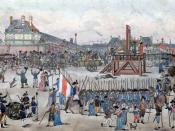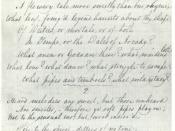1. a. 'Revolution and Reaction'- Toward the end of the eighteenth century, two
revolutions occurred outside England that indirectly threatened the stability of the British
political and social systems. The French Revolution began on July 14, 1789, when a
group of French citizens stormed the Bastille, a Paris prison for political prisoners. During
the following weeks the revolutionaries approved a document called the Declaration of
Rights of Man, affirming the principles of 'liberty, equality, and fraternity.' France
became a constitutional monarchy. Revolutionary violence reached its peak, as the
Jacobins, under the leadership of Maximilien Robespierre, began what is called the Reign
of Terror.
b. 'The Reign of Terror'- During this time period British leaders did not want France
or any other nation to win dominance on the European continent. In 1793, France took
the initiative by declaring war on Britain. Thus began a series of wars that would drag on
for twenty-two years, creating fear and rigidity within Britain and effectively squelching
during that time all hope of reform within British society.
The battles at Waterloo, ended
the great Napoleon's reign, but not till he conquered almost all of Europe.
c. 'Coping with Society's Problems'- During this era, Britain's government ignored the
many problems that arouse. Many of these problems were a result from the Industrial
Revolution. The problems that arouse were not ones that were going to vanish,
overcrowded towns, the unpleasant and unsafe working conditions in the factories, the
long working hours, and the low pay experienced by the workers. During this time,
Britain had a series of weak and ineffective royal heads. George III, long subject to bouts
of insanity, went irretrievably mad in 1811. George III, and his predecessors all had there
flaws, however, finally Parliament passed the first law governing factory safety which mad
the people happy after the government pushed them down and ignored them.
d. 'The Beginnings of Romanticism'- Writers of the Romantic Age reacted strongly to
the events of their time. They all felt the stirrings of excitement or repulsion as they
contemplated the French Revolution. Those who had applauded the French Revolution,
envisioning a new age of democracy and equality in Britain, were left in a state of bitter
disappointment. They turned their attention to literary endeavors, creating a Romantic
style that offered a new perspective on the world, a perspective that focused on nature and
'the common people.' Jean-Jacques Rousseau planted on f the seeds from which
Romanticism grew. Also during this time Johann Wolfgang von Goethe, turned to the
German literature of the Middle Ages, early vernacular works filled with myth and
superstition, adventure and passion, not unlike the Anglo-Saxon Beowulf.
e. 'The Romantic Age in British Poetry'- Poetry was the dominant literary form
during the Romantic Age, but not the only one. Many significant prose works also
appeared, mainly in the form of essays and novels. In time, however, periodicals that were
more sympathetic to the Romantics came into being. One such publication, The London
Magazine, although it appeared only from 1820 to 1829, attracted major contributions
from the three greatest essayists of the era: Charles Lamb, William Hazlitt, and Thomas
De Quincey. The Romantic fascination with mystery and the supernatural made such
novels quite popular during the Romantic Age. One of the most successful was
Frankenstein, written by Shelley's wife, Mary Wollstonecraft Shelley. The close of
Britain's Romantic Age is usually set in 1832, the year of the passage of the First Reform
Bill. However, the ideas of Romanticism remained a strong influence on many writers
from following generations.
2. a. Wordsworth- 'My Heart Leaps Up When I Behold', Lyrical Ballads
b. Coleridge- Lyrical Ballads, 'Kubla Khan'
c. Byron- Childe Harold's Pilgrimage, Don Juan
d. Shelley- 'Queen Mob', The Necessity of Atheism
e. Keats- 'Ode on a Grecian Urn', 'When I Have Fears That I May Cease to Be'
3. The lines reflect the theme in many ways. It shows how nature's beauty has nothing
written about it. He believes everyone has feelings of nature's beauty but no one writes
their feelings and their visions. He expresses his love for nature and its beauty. It tells
how deep inside his heart and soul he has a love for nature and how nature effects his
writings and feelings.
4. That everyone wants power and immortality. Everyone wants power and immortality
but not everyone achieves these things. However, Ozymandias has achieved power and
immortality. He has built a great power, and now people will remember him. Through
time things have vanished. His statue hasn't. He has achieved immortality, people today
still know of him and his power, that is what he believed everyone wants.
5. 'Ode On a Grecian Urn' reflects the life of the common people. It shows that the life
of the common people is the philosophy of the Romanticist. It shows the beauty of the
common life and common things how it effects everyone. It reflects that beauty is the
truth and truth is beauty and that reflects the ideals of a true Romanticist.


